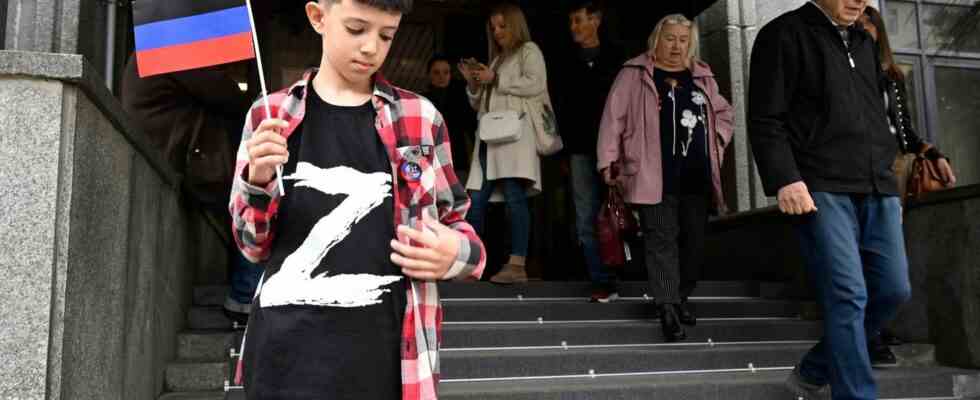Occupied Territories in Ukraine
After the referendums comes the annexation – how that can affect warfare
Holding the flag of the Donetsk “People’s Republic” and the “Z” of the Russian occupying forces on his shirt: the referendum on the union with Russia has begun in the embassy of the self-proclaimed state in Moscow.
© Alexander Nemenov / AFP
Four mock referendums have started in the occupied territories of Ukraine. After that, Luhansk, Donetsk, Cherson and Zaporizhia belong to Russia, and from Moscow’s point of view, Ukraine suddenly becomes the aggressor. What does that mean for war?
The controversial “referendums” begin in the Russian-occupied east and south of Ukraine. The population there is asked whether they want to belong to the Russian Federation. The answer is already clear, the leaders in the four (separatist) regions and especially in Moscow are unlikely to accept anything other than a clear yes. Internationally, however, the referendums will not be accepted, as Ukraine, most European countries, the USA and Turkey have already announced.
referendum on martial law
The circumstances alone make it clear that these are bogus referendums with a presumably manipulated outcome: the polls are taking place without the consent of Ukraine, whose territories are being voted on, independent observers are not permitted, martial law applies there, and Russia and the separatists do not even check the whole area where the referendums will be held. But the results are only pro forma anyway. The focus for the Russian government is to incorporate the Luhansk, Donetsk, Cherson and Zaporizhia regions.
The affected area of more than 100,000 square kilometers corresponds to the size of Bavaria and Baden-Württemberg together. According to Kremlin chief Vladimir Putin, it is part of “historic Russia”. In his view, Ukraine has no claim to the areas anyway. Since the occupation of parts of the Donbass in 2014 and the invasion of eastern and southern Ukraine, Moscow has been creating facts accordingly. In the affected areas, newborns are automatically given Russian citizenship, just as Russian passports are otherwise generously issued and the Russian ruble has replaced the Ukrainian hryvnia as a means of payment.
Cynical version of the perpetrator-victim reversal
The government in Moscow had already acted in this way with the illegal annexation of Crimea in 2014. There, too, international recognition has failed to materialize. With the pseudo-legitimation of Luhansk, Donetsk, Cherson and Zaporizhia as “Russian,” Putin’s main concern is likely to see any military action there as an attack on his own territory. This is also perfidious because Ukraine is of course fighting to reconquer areas occupied by Russia. In other words, the attacked state of Ukraine, trying to defend itself against the invaders, would suddenly become an aggressor. A particularly cynical version of the perpetrator-victim reversal.
Even before the referendums began, Putin underscored the seriousness of his annexation plans with the threat: “If the territorial integrity of our country is threatened, we will absolutely use all available means to protect Russia and our people.” By this he also expressly means the use of nuclear weapons. But how seriously does the Kremlin boss mean that?
At the beginning of the Ukraine war, the President of Russia justified the invasion of the neighboring country by saying that he wanted to “liberate” Ukraine from the alleged “Nazi rule”. Anyone who prevented Moscow from doing so would face dire consequences. At that time, too, Putin had threatened, at least indirectly, with nuclear weapons. Because Ukraine is now being supported by EU states and the United States, Moscow is saying that Russia is not fighting Ukraine, but NATO or the “collective West.” This is also one reason why heads of government such as German Chancellor Olaf Scholz and US President Joe Biden are reluctant to supply main battle tanks to Ukraine. This could turn the West into a “real” war party.
Will Russia stick to its course?
Kyiv takes the announcement from Moscow calmly. President Volodymyr Zelenskyy had said that Ukraine would not be intimidated. Targets in Russian-occupied Crimea have repeatedly been attacked in recent months, presumably by the Ukrainian side. According to Moscow’s understanding of the area, this should have triggered direct reactions, but this did not happen. Of course, this is not an all-clear signal, because Russia’s leadership seems ready at any time to change its approach.
Sources: DPA, AFP, “FAZ“, daily News, Deutschlandfunk


